View From the Fifth – September 2012

“I Should Have Called A Lot Earlier.”
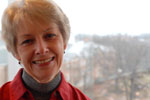
It’s not uncommon for our staff to hear comments like, “I should have called a lot earlier.” It’s one more indication of how our expert librarians are making a difference in the teaching, research, and patient care activities that define our busy students, faculty and clinicians, wherever they are. Dr. Benny Joyner – to whom the above quote is attributed – certainly felt that way when he turned to HSL librarian Mellanye Lackey to help gather and present the evidence-based information he needed to help shape a treatment protocol potentially affecting children all over the world.
Sometimes our users benefit from our strengths in unanticipated ways, like when the NC AHEC program staff was struggling to manage an overload of information needed to help NC primary care practices implement electronic health records, required by the Affordable Care Act. And sometimes our strengths are reflected in the groundbreaking research we support. I know Dr. Myron Cohen, a member of our Board of Visitors and one of our most vocal advocates, knows a strong HSL is essential to strong research. His work was recognized recently when he received the top honor of the inaugural Clinical Research Forum Top 10 Clinical Research Achievement Awards for his groundbreaking HIV research. We congratulate him, along with his colleagues at UNC-Chapel Hill who have done so much to advance HIV-related research, a staggering number of whom made presentations at the recent XIX International AIDS Conference in Washington D.C.
The HSL’s ability to properly support this kind of life-altering research, as well as provide our expertise exactly where it is needed, is only possible with strong private support, like the Medical Alumni Association (MAA)’s ongoing interest in the Medical Alumni Electronic Information Center in our library. Due to the generosity of MAA members, we were able ensure that this highly used and appreciated area of our library received a state-of-the-art upgrade.
Like the Association, your belief in the value of the Health Sciences Library in shown by your past support. If your generosity has already been directed toward our library this year, thank you. If you would like to make a gift, you can do so quickly and securely via our online giving page, or by contacting Dwain Teague (919-962-3437 or dteague@email.unc.edu) for more information.
Carol Jenkins
Director, UNC Health Sciences Library
In this Issue:
- Library Resources Empower Physician to Help Save Children’s Lives
- HSL Board Member Receives Prestigious Research Award
- Medical Alumni Help Improve Popular HSL Computing Area
- Bringing Order to the Chaos of Electronic Health Record Implementation
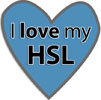
The start of a new academic year ushered in the arrival of a new group of Carolina health affairs students and UNC Hospitals residents. The UNC Health Sciences Library is buzzing with action and we are grateful that the new arrivals are already recognizing the value of our resources and services, as illustrated by the following submission to the I Love My HSL blog by a new Allied Health Sciences graduate student:
“I love the design of the library; the way in which everything is structured on all floors in a similar manner makes finding my way around a lot easier. The variety of resources available is certainly something that excites me and I look forward to growing into a better researcher and scholar.”
View other submissions to the blog or post your own message
Library Resources Empower Physician to Help Save Children’s Lives
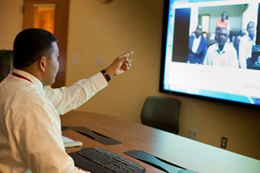
As just one of many powerful examples of how the UNC Health Sciences Library (HSL) supports our users, we share the story of Dr. Benny Joyner (MD/MPH ’02, Assistant Professor of Anesthesiology and Pediatrics, Division of Pediatric Critical Care Medicine, UNC School of Medicine).
Dr. Joyner was deeply troubled by the conclusions of the New England Journal of Medicine (NEJM) article “Mortality after Fluid Bolus in African Children with Severe Infection,” which stated:
Fluid boluses significantly increased 48-hour mortality in critically ill children with impaired perfusion in these resource-limited settings in Africa.
His concern pushed him to collaborate with others on a response to challenge the article’s findings. The response was also published by NEJM.
“If what they were saying was right, it flies in the face of everything I’ve been doing for nearly ten years in Emergency Pediatrics,” says Dr. Joyner.
As part of the ensuing debate, Dr. Joyner was invited to help Médecins Sans Frontières (Doctors Without Borders – MSF) shape any worldwide recommendations the organization would make on the subject. He welcomed the opportunity, but only had two weeks to prepare his case for the meeting in Belgium, while still working night shifts at UNC Hospitals. His initial literature search only compounded the challenge by producing 120,000 articles!
Dr. Joyner needed help, so he turned to Mellanye Lackey, an HSL Liaison Librarian who had assisted and collaborated with him before on other important projects. Mellanye worked with Dr. Joyner to put together a precise, yet comprehensive search strategy. As a result, he was able to fully leverage the myriad of resources the HSL purchases, manages and makes accessible for the Carolina health affairs community. Then she spent seven hours organizing the resulting information, a task Dr. Joyner says would have taken him days, maybe weeks, and would likely not include some important articles. Furthermore, Dr. Joyner admits he would never have been able to format all the information in such a user-friendly way. Mellanye also placed PDF’s of all the articles in his Dropbox where he could read them at any time, including on his iPad as he flew across the Atlantic without Internet access.
“It wasn’t just the information she provided – which was incredible – it was the way Mellanye organized the information for me and how quickly she could do it,” says Dr. Joyner. “It was awesome! It gave me the ability to efficiently assimilate the latest, current literature in fluid resuscitation in pediatrics in the short and pressured timeframe I had. I already had the ability to speak as a result of what I had learned experientially, but that wasn’t enough for the meeting.”
The value of Mellanye’s neatly-packaged information was further brought to light as the meeting unfolded when Dr. Joyner was able to refer the other world health experts to specific articles as they were discussed and/or questioned.
“Having reviewed all the articles and having them at my fingertips at all times was invaluable,” said Dr. Joyner. “Just my experience wasn’t enough to compel a change. However, in my opinion, having the body of evidence to support what I practice clinically allowed me to make a recommendation based not only in experience, but also a solid evidence base. And I would not have been standing on such a solid base during the meeting without Mellanye and the HSL.”
Dr. Joyner’s participation in the Brussels meeting played a significant role in shaping MSF’s latest worldwide recommendations on emergency pediatric fluid resuscitation. And with the help of the HSL, he was able to positively impact the lives of hundreds, if not thousands, of children treated by MSF health care providers throughout the world.
When reminiscing about the series of events a couple of weeks after the meeting, Dr. Joyner finishes the conversation by looking at Mellanye and sheepishly admitting something our librarians often hear:
“I should have called you a lot earlier.”
Information saves lives. But it must be vetted, organized, and accessible before talented people can put that information to use. Managing information is one area where the HSL makes its impact. And as Dr. Joyner can attest to, in some cases that impact can touch thousands of lives across the globe.
HSL Board Member Receives Prestigious Research Award
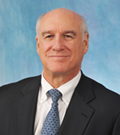
The strength of the UNC Health Sciences Library (HSL)’s Board of Visitors was on display yet again when Myron Cohen, MD, Associate Vice Chancellor for Global Health, J. Herbert Bate Distinguished Professor Director, UNC Institute for Global Health & Infectious Diseases Chief, Division of Clinical Infectious Disease, has received the top honor of the inaugural Clinical Research Forum Top 10 Clinical Research Achievement Awards for his groundbreaking research on treatment as prevention of HIV.
“We are fortunate to have someone of Dr. Cohen’s stature on our Board of Visitors,” said Jake Wiltshire, the HSL’s Director of Develop and Communications. “We are even more fortunate to have him as a passionate voice on behalf of our library, constantly affirming the critical importance of what we do to support researchers, learners, teachers and patients at home and abroad.”
Cohen himself wrote on the IGHID’s blog: “I know I have said it before, but one of the things that is special about this campus is that we have schools in all five health disciplines: medicine, public health, dentistry, nursing and pharmacy. More importantly, they are all on the same campus, within walking distance, and joined at the center by our world-class Health Sciences Library.”
Cohen’s study, HIV Prevention Trials Network 052, showed that treating people with HIV with antiretroviral therapy renders them virtually non-contagious, reducing sexual transmission by 96 percent. The study findings, which were published in the August 11, 2011, issue of the New England Journal of Medicine, were first made public in May 2011, four years before the study’s scheduled completion, because they were so overwhelmingly positive.
HPTN 052 convincingly demonstrated that HIV treatment is the most powerful prevention tool currently available.
“Objectively, very few clinical trials have had the impact of HPTN 052,” said Marschall S. Runge, MD, PhD, chair of the department of medicine and executive dean at the UNC School of Medicine. “The study is a remarkable example of clinical research from ‘bench to bedside’ that informs public health policy.”
HPTN 052 was largely funded by the National Institute of Allergy and Infectious Diseases, with additional funding from the National Institute on Drug Abuse and the National Institute of Mental Health, all part of the NIH.
Medical Alumni Help Improve Popular HSL Computing Area
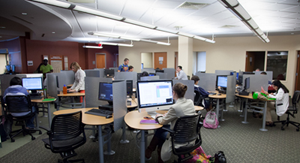
As technology changes the way our users work, the UNC Health Sciences Library (HSL) is increasingly focused on how best to deliver the resources and services our users need outside of our physical building. But most days if you wander around our building, from the moment it opens to the close, you will see that our space is a very highly valued commodity. Consequently, the HSL is constantly ensuring that our space is the best it can be for users.
As part of the renovation of the HSL that was completed in 2004, the Medical Alumni Association (MAA) provided the funds to create the Medical Alumni Electronic Information Center, an area on the first floor of the library that provides users with access to computers and other technology while on campus. Since its inception it has been a hub of activity for users. Aided by the ongoing annual support of the MMA, the HSL was able to once again update and improve the area, which now provides access to four new iMacs and 26 new Windows computers. The new equipment is also accompanied by new furniture (ergonomic chairs and modern-looking, private work areas), making this busy area more comfortable for users.
“We are extremely grateful for the ongoing, annual support the HSL receives from Medical Alumni Association,” said Jake Wiltshire, HSL Director of Development and Communications. “Without their support we wouldn’t have been able to make all the upgrades we wanted without delaying or negatively impacting other crucial funding needs.”
Bringing Order to the Chaos of Electronic Health Record Implementation
The challenges of implementing electronic health records systems in large medical centers is enormous but the challenge can be just as great in rural primary care practice sites unaffiliated with a health care system. The North Carolina AHEC Program has a history of working to improve the quality of health care in North Carolina, so when they were awarded a federal grant as part of the HITECH Act to create Regional Extension Centers (REC) to assist with the transition to electronic health records in rural, primary care practices it was a great opportunity to expand the scope of quality improvement across the state. This marriage of existing quality improvement programs led a staff of one growing to 30, and a handful of practices served expanding to hundreds.
The nine AHECs throughout North Carolina have over 50 staff helping almost 3,900 health-care providers choose an electronic records system and make improvements to serving patients based on data collected through the records. Providers are required to meet federal and state standards for meaningful use of the electronic records to receive incentive payments.
The challenge was to share recommendations, advice, and best practices between the AHEC Quality Improvement staff (QI) across the state. The details of getting to meaningful use were daunting, and the amount of information that was coming out on all fronts felt overwhelming at times. AHEC librarians were struck at the sense of information overload the REC consultants were feeling and they wanted to offer help in managing the information critical to achieving success for the project.
“In order to support the ongoing training and information needs of staff providing high-stakes, complex services to busy, time-constrained practice staff, our very small program office-based team needed a way to curate a constant stream of information efficiently and effectively and make it available immediately,” said NC AHEC QI manager Laura Brown.
AHEC leadership turned to the HSL for help in part because of the long-standing relationship between the two organizations. That relationship includes HSL’s ongoing management of the AHEC Digital Library. “As field-based staff, [the REC consultants] require easy, web-based access to rapidly-changing information,” said Brown. “Given the constantly expanding body of knowledge our staff must synthesize and apply in order to support practices with whom they work our program’s dependence on information and knowledge management cannot be overstated.”
The HSL’s AHEC Digital Library staff had been working on providing a suite of tools that would allow AHEC staff to work collaboratively throughout the state. One of these tools was a wiki that would allow users to post, edit, and collaborate in creating documents. At first, HSL librarians used their wiki tool to create a space to archive consultant emails and other key files. However, because information hadn’t been standardized and collected appropriately, problems such as being able to find documents that had already been posted or creating duplicate copies of the same documentation, persisted. As a result, librarians came up with a three-part, comprehensive solution to organize the information in a standard format and make future retrieval easier: AHEC Librarian Mary Beth Schell led the development of:
- A standardized, easy-to-read format for all emails, emphasizing key information and eliminating redundancy. To date approximately 1200 emails have been reformatted and included in the wiki.
- A tagging vocabulary of approximately 300 tags (and growing) addressing important concepts, including all aspects of the electronic health records incentive program. Top used examples include specific vendor names, Meaningful Use, NCQA, PCMH, EHR Implementation, and EHR attestation
- A set of 9 categories with which users can find information by browsing the wiki. . The categories with the most underlying links and pages are Certified Technology and Rules and Regulations
While librarians are known for their skills in evidence-based literature searching, this project relies heavily on the librarian’s information management skills to organize and categorize information so that it is more useful and retrievable. NC AHEC Associate Director for Quality Improvement, Ann Lefebvre explains that there is no cookbook on how to do this and that is what makes this wiki so useful. It provides timely information that is readily available in the field. Each practice is unique so it is very useful to have one place where the consultants can login and find the information that they need when and where they need it.






